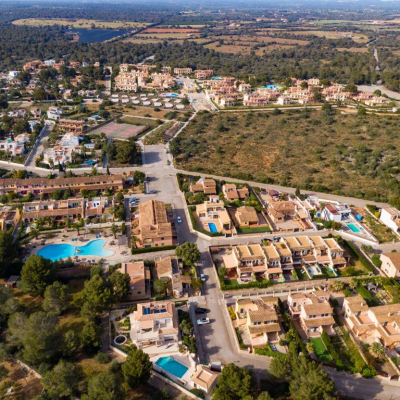Renting in Spain

Now that you've settled on an area in Spain to live and perhaps even secured a job, the first order of business will be finding a place to call hogar dulce hogar, your home sweet home.
Though the housing market in Spain is showing signs of stabilizing, many are wary to commit to buying any kind of property, instead opting to rent. This provides the security of knowing that no decision is final when it comes to living situation.
Characteristics of Renting in Spain
Renting in Spain is worlds different than renting in several other countries. For starters, many apartments for rent in big cities have been passed down through the generations, and landlords, called dueños, want to make a profit to help offset mortgage costs they've also inherited. Expect apartments to be furnished, but often with old, heavy furniture and mismatched dishware.
Dueños will expect you to pay the month's rent within the first five days of the month, sometimes passing by to collect it or asking you to drop it off. Utilities to be paid will greatly depend on the location, though some are included. You may need to contract telephone and Internet, water or gas, and usually a building upkeep fund, called comunidad, is expected by each apartment's tenants monthly. For a flat in a city, the utilities, called gastos, might be about:
- Electricity 100€/month
- Water 50€/month
- Phone/Internet 30 - 50€/month
- Building Upkeep 25 - 50€/month
Spanish houses are not always equipped with such things as central air or heat, ovens or endless hot water. Consider what's important to you and realize that not all apartments may meet your standards of living. Likewise, some are in need of repair, a new coat of paint or some additional basics. Ask your landlord what he or she is willing to cover, and how to alert him of any problems you see (case in point: I was embroiled, along with my roommates and the neighbor downstairs, in a battle with the building's manager about who would have to pay for pipes that leaked from our shower into the neighbor's garden. We moved out before the issue was ever resolved, relying on our landlady to take care of it).
Apartments can be rented out as a whole, or just for one room within them. Make sure you're clear on which you'd like, even if that means having to look for roommates to help offset the cost of the flat.
Rental Prices
Rental fees will vary greatly due to the city and region, proximity to the center, size of property, whether or not you're sharing and the amenities available in the housing. Typically speaking, cities are more expensive to live in, and the closer you are to the city center, the more you'll pay.
Example Rates
- City - €200 – 500 per bedroom or €1000 - 1500 per flat
- Suburbs - €120 - 250 per bedroom or €1000/flat
- Countryside - very few apartment rentals available. Most tend to be houses or chalets with widely varying rental prices.
Using Real Estate Agents and Companies
Many relocation and real estate agencies are helping more expats than ever move to Spain, lured by the low cost of living and climate. While the majority of these are clumped in tourist enclaves like the Costa del Sol and the Costa Dorada, it's not uncommon to use local services if your spoken Spanish is strong. A quick online search will yield dozens of companies, which might include
Or several expats themselves who can help ease the transition into life in Spain. As a rule of thumb, sellers will charge about 3% of the property's value, though some will ask for a flat fee for services rendered.
Do note that real estate agents work more with property acquisitions rather than rentals, so you may need to do more of the legwork yourself.
Where to Look for Property on Your Own
Nowadays, online pages advertise every type of property in even the most remote areas in Spain. Because of this, scams are rampant, so never give your information out online. Instead, ask to see the flat in person. This means finding a temporary place to stay, whether through couchsurfing or staying at hotels, is a necessary cost.
Online Sites
One of the more popular ways to browse properties is through online pages that offer information, pictures and contacts – particularly in big cities.
You can have a look at our partners in our directory listing for accommodation in Spain and contact them directly for information.
Some other popular choices are:
Se Aquila signs
Sometimes great results are provided by simply walking around an area you'd like to live in and jotting down numbers. You can then contact the tenant or landlord and ask to see the property.
Classified Section
Many city newspapers have classified ads which promote long-term stays. A popular option in Seville, for example, is the El Cambalache newspaper, which offers dozens of listings and is published weekly. You can pick up newspapers at kioskos around your city, or at tobacco shops.
Documentation and Securing a Place
Once you've found a place you're interested in living, it's advisable to sign a contract. This will allow you be become empadronado and enjoy benefits such as using the public library or swimming pools in the area, along with proving the years you've resided in Spain. This document will contain your pertinent information, so be sure to have a passport or resident card number, your birthdate, your permanent address and phone number. Contract details will vary according to the renter, but will usually contain information about payment and conditions in upkeep.
Typically, the landlord will ask for a security deposit of one month's rent in full, in addition to the first month's rent. This fee can sometimes be used as a last month's rent, or will be surrendered when the contract has terminated.
Be sure you understand the details of your contract fully, and speak with the building manager about any extra important factors and the landlord's reputation.
Pertinent Vocabulary
- a estrenar - brand new
- aire acondicionado (a/a) - air conditioning
- alquilar/se Aquila - to rent / for rent
- alquiler - rent to be paid monthly
- amueblado - furnished
- aseo - half bath
- ático - attic apartment
- ascensor - elevator
- balcón/balcones - balcony
- bajo - ground-floor
- baño - full bathroom
- calle or c/ - street
- climatizado (f/c) - heated
- cocina amueblada - full kitchen with appliances
- commission - commission or agency finder's fee
- comunidad - community building upkeep
- dormitorio - bedroom
- electrodomésticos - small appliances
- studio - studio apartment
- fianza - security deposit
- garaje - garage
- habitación - room
- Inmobilarios - agency or real estate company
- lavadora - washing machine
- Lavaplatos or lavajillas - dishwasher
- luminoso - Well-lit, bright
- Microndas - microwave
- muebles - furniture
- piso - Flat, apartment
- Planta - floor
- plaza garaje - Parking space in a garage
- Porter - doorman
- reformado - reformed
- Rehibilitado - rehabilitated
- salon - room, typically living room
- sin muebles - unfurnished
- trastero - storage cupboard
- vender (se vende) - To sell (for sale)
By Cat Gaa, who left her native Chicago five years ago to live in the olive groves of Andalusia. Residing in Seville, she teaches first grade at a private school, but all she wants to really do is write.
- My Life Abroad -
A selection of expat stories

"A fun compulsive read!"
J. Matcham, Amazon
"I strongly advise people ready to live abroad to read this book!"
Patrice, Amazon

 Finding an area in Spain
Finding an area in Spain Guide to buying Spanish property
Guide to buying Spanish property The Ultimate Guide: Buying Real Estate as an Expat
The Ultimate Guide: Buying Real Estate as an Expat  Embassies and Consulates in Spain
Embassies and Consulates in Spain Why using an alternative broker for large money transfers
Why using an alternative broker for large money transfers